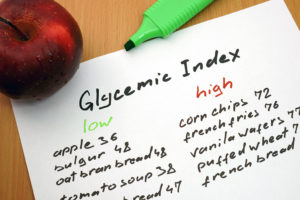
Amid the endless low-carb diets and perpetual fears of weight gain, carbohydrates have gotten a rather bad rap over the years.
Is it possible to scrutinize carbs, sorting the better from the bad?
Yes. And it all starts with the glycemic index.
Glycemic index
Low-glycemic diets have been touted as an effective method to control blood sugars and help with weight loss.
The glycemic index measures the rate at which a given food raises an individual’s blood sugar. The 0-100 scale classifies foods as low (55 or lower), medium (56-69) or high (70 or higher) on the glycemic index.
Foods that don’t raise blood sugar quickly are considered low glycemic, such as stoneground whole wheat and most fruits. Higher-glycemic foods, such as white bread, raise blood sugar levels quickly.
Glucose, a type of sugar, is used as the reference point for the index.
Better control of blood sugar helps not only with diabetes control and prevention, but also with weight control. (Higher blood sugar puts the body into a constant fat-storage mode.)
Low-glycemic foods also make you feel fuller longer, helping with cravings and satiation. Consequently, we eat less and lose more weight.
Low-glycemic foods include items such as beans (black, pinto, garbonzo, etc.), seeds, whole grains most vegetables and most fruits.
Not coincidentally, these types of food are promoted in the Mediterranean diet.
The Mediterranean diet
The Mediterranean diet includes fish, fruits, vegetables, whole grains, nuts, beans and healthy oils, such as olive oil and the oils gained from avocados. Many studies have shown the benefits of a low-glycemic, Mediterranean-type diet.
A study in the Journal of the American Medical Association, which compared low-fat, low-carb and low-glycemic diets, found that those who consumed low-glycemic items maintained their weight loss from dieting and had an increased metabolism, burning an additional 150 calories per day. The diet also had no negative impact on cholesterol or hormone levels.
A study in the New England Journal of Medicine compared a Mediterranean diet—supplemented with olive oil or nuts—with a typical low-fat diet.
In this case, researchers found those on the Mediterranean diet had a 30 percent reduction in risk for cardiovascular events such as heart attack or stroke. This was found to be true even when participants didn’t lose weight.
As you can see, whole, fresh foods are the way to go if you’re aiming for long-term, sustainable results in weight loss or blood sugar control.
And the best way to achieve that is through the Mediterranean diet.
 /a>
/a>
 /a>
/a>
 /a>
/a>